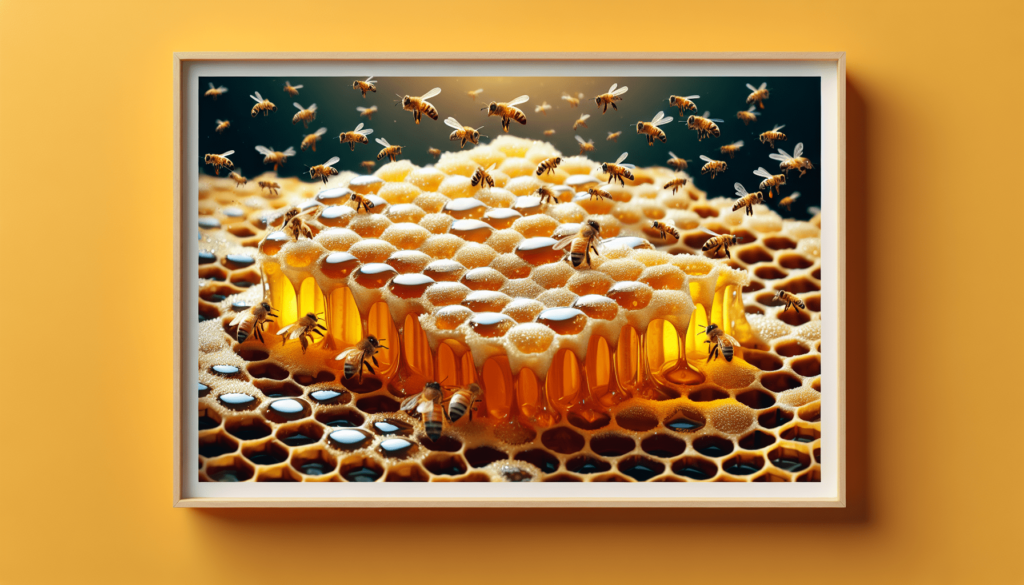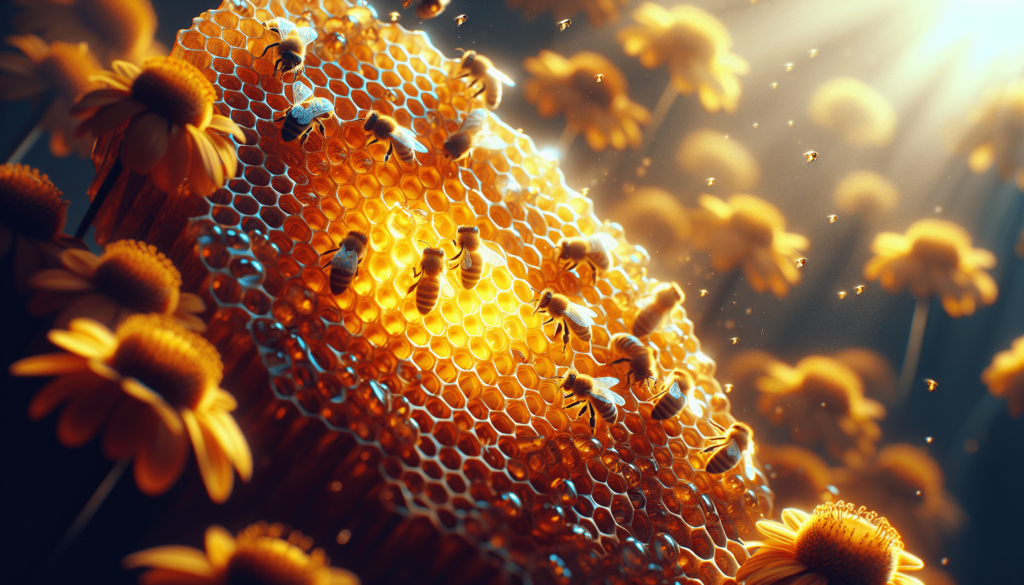If you’ve ever struggled with seasonal allergies, you know how relentless and frustrating they can be. Sneezing, itchy eyes, and a runny nose can make even the most beautiful spring day feel unbearable. But what if there was a natural remedy that could provide relief? Enter honey, the sweet and sticky substance that has long been hailed for its medicinal properties. In this article, we’ll explore whether honey can truly help alleviate the symptoms of seasonal allergies, offering hope for those who are tired of relying on over-the-counter medications. So sit back, relax, and discover the potential benefits of nature’s golden elixir.

What are seasonal allergies?
Introduction to seasonal allergies
Seasonal allergies, also known as hay fever or allergic rhinitis, is a common condition that occurs when your immune system overreacts to allergens present in the environment during certain times of the year. These allergens, such as pollen from trees, grasses, or weeds, trigger a cascade of immune responses, leading to symptoms like sneezing, congestion, itchy and watery eyes, and a runny nose. Seasonal allergies can significantly impact your quality of life, making it essential to find effective ways to manage and alleviate these symptoms.
Common symptoms of seasonal allergies
Seasonal allergies can manifest with several common symptoms. These may include frequent sneezing, a blocked or runny nose, itchy or watery eyes, sore throat, coughing, fatigue, and even mild asthma symptoms like wheezing or difficulty breathing. Some individuals may also experience irritability or trouble sleeping due to the discomfort caused by these symptoms. It’s important to be able to recognize these common signs to determine whether you are indeed dealing with seasonal allergies or another condition that requires specific medical attention.
The connection between honey and allergies
Historical use of honey for allergies
Honey has been used for centuries in traditional medicine to alleviate allergic symptoms. It has been believed to possess natural antihistamine properties, which are responsible for reducing the allergic response in the body. Ancient civilizations, including the Egyptians and Greeks, documented the use of honey for various ailments, including allergies. While historical evidence is not always backed by scientific research, it does suggest that honey has been valued as a potential remedy for allergic conditions for a long time.
The theory behind honey’s potential benefits
The theory behind honey’s potential benefits for allergies lies in its ability to act as a natural immunotherapy. Honey is produced by bees from the nectar of flowering plants, which can contain small amounts of pollen. When consumed, honey can expose the body to these trace amounts of allergens, similar to the concept of allergy shots. Over time, regular exposure to these minimal amounts of allergenic pollen may desensitize the immune system, leading to a reduced allergic response and a decrease in allergy symptoms.
Scientific research on honey and allergies
While the historical use of honey for allergies is intriguing, scientific research on this topic is still limited and inconclusive. Some studies have suggested that honey may have mild anti-inflammatory and antioxidant properties, which could potentially benefit those with allergic conditions. However, there is a lack of large-scale, well-designed clinical trials to definitively prove honey’s effectiveness as a treatment for seasonal allergies.
Nutritional properties of honey
Overview of honey’s composition
Honey is a natural sweetener produced by bees using nectar from flowers. It consists primarily of carbohydrates in the form of fructose and glucose, making it a concentrated source of energy. In addition to carbohydrates, honey contains small amounts of vitamins, minerals, enzymes, amino acids, and antioxidants. The exact composition of honey can vary depending on factors such as the floral source, geographical region, and processing methods.
Antioxidant and anti-inflammatory properties of honey
One of the key nutritional properties of honey is its antioxidant capacity. Antioxidants help protect the body against oxidative stress, which can contribute to inflammation and various chronic diseases. Honey contains several antioxidant compounds, including polyphenols and flavonoids, which have been associated with potential anti-inflammatory effects. While research on honey’s antioxidant and anti-inflammatory properties is still ongoing, these properties might contribute to its potential benefits in managing seasonal allergy symptoms.

Types of honey
Different types of honey
Honey comes in various types, each with its unique flavor, color, and composition. The specific characteristics of honey can vary depending on the floral source from which the bees collected the nectar. Some common types of honey include clover honey, wildflower honey, manuka honey, buckwheat honey, and acacia honey. Each type of honey may offer slightly different health benefits and flavor profiles, so it’s worth exploring different varieties to find the one that suits your preferences and needs.
Varieties recommended for allergies
While any type of honey may offer some potential benefits, certain varieties are often recommended for managing seasonal allergies. Raw, unfiltered honey is a preferred choice as it is minimally processed and retains more of its natural enzymes and pollen content. Additionally, locally sourced honey may contain pollen specific to your geographic area, potentially exposing you to the allergens triggering your symptoms. However, it’s important to note that the amount of pollen in honey is typically minimal, so its impact on desensitization needs further research.
Using honey to alleviate seasonal allergy symptoms
Consuming honey as a natural remedy
If you’re considering using honey as a natural remedy for seasonal allergies, it’s essential to understand how to incorporate it effectively into your routine. While honey is generally safe for consumption, it’s recommended to start with small amounts, especially if you have never consumed honey before. Gradually increase your intake to gauge your body’s response and potential allergic reactions. Remember that honey should not replace prescribed medications or allergy treatments. It is best used as a complementary approach to managing symptoms.
Incorporating honey into your diet
To incorporate honey into your diet, you can use it as a natural sweetener in hot or cold beverages like tea or lemon water. It can also be used as a spread on toast, waffles, or pancakes, or as an ingredient in homemade salad dressings, marinades, and desserts. However, keep in mind that honey is still a source of calories and sugar, so it’s important to moderate your intake and consider the overall balance of your diet.
Dosage and safety considerations
The optimal dosage of honey for alleviating seasonal allergy symptoms is yet to be determined, as research in this area is limited. However, starting with one to two teaspoons of honey per day and gradually increasing the amount based on your tolerance is a reasonable approach. It’s essential to choose high-quality honey from trusted sources and store it properly to maintain its freshness. If you have known allergies to bee products or pollen, it’s crucial to exercise caution and consult with a healthcare professional before incorporating honey into your routine.
Other natural remedies for seasonal allergies
Alternative remedies to consider
While honey is a popular natural remedy for managing seasonal allergies, there are also other alternatives worth considering. Some individuals find relief by using saline nasal rinses or sprays to rinse out allergens from their nasal passages. There are also herbal supplements, such as butterbur or stinging nettle, that have been studied for their potential anti-allergic effects. However, it’s important to remember that the efficacy of these alternative remedies may vary from person to person, and consulting with a healthcare professional is advisable before starting any new treatment.
Complementary therapies to support allergy relief
In addition to alternative remedies, various complementary therapies can support overall allergy relief. Acupuncture, for example, has been suggested to help alleviate symptoms in some individuals. Additionally, practices like yoga and meditation may help reduce stress, which can potentially improve immune function and decrease allergic responses. It’s important to approach these complementary therapies as part of a holistic approach to managing allergies and to use them in conjunction with other evidence-based treatments.
Precautions and considerations
Potential risks and allergies to honey
While honey is generally safe for consumption, it’s crucial to be aware of potential risks and allergies associated with it. Infants under one year of age should not consume honey to avoid the risk of infant botulism, a rare but serious form of food poisoning. Some individuals may also be allergic to honey or its components, experiencing symptoms like hives, itching, or respiratory distress. If you experience any adverse reactions after consuming honey, it’s important to seek medical attention promptly and discontinue its use.
Consulting a healthcare professional
Before using honey or any natural remedy for managing seasonal allergies, it’s advisable to consult with a healthcare professional, especially if you have underlying health conditions or are taking other medications. They can provide personalized advice, assess potential interactions or risks, and guide you in finding the most effective approach to managing your allergy symptoms. It’s important to remember that healthcare professionals are best equipped to provide evidence-based recommendations and ensure your safety.
Combining honey with existing allergy treatments
If you are currently using prescribed allergy medications or treatments, it’s important to speak with your healthcare provider before starting honey or any other natural remedy. While honey may offer potential benefits, it should not be used as a substitute for medically approved treatments. Your healthcare provider can assess the compatibility of honey with your existing treatment plan and ensure that it complements your current allergy management approach.
Personal anecdotes and testimonials
Stories of individuals who found relief with honey
Many individuals have shared personal anecdotes and testimonials about finding relief from seasonal allergy symptoms through the use of honey. Some claim that regularly consuming honey from local sources helped reduce the severity and frequency of their allergic reactions. While these stories are subjective and not scientifically proven, they highlight the potential positive experiences some people have had with honey as a natural remedy. It’s important to consider these personal accounts alongside scientific research and consult with a healthcare professional for personalized advice.
Caution about anecdotal evidence
While personal anecdotes can be valuable sources of information, it’s crucial to approach them with caution. Individual experiences with honey and its potential benefits for allergies may vary significantly depending on various factors, including the severity of the allergies, personal sensitivities, and other concurrent treatments being used. Anecdotal evidence should not be the sole basis for making healthcare decisions, and it’s always best to rely on scientifically validated research and expert advice when considering treatment options.
Conclusion
Summary of honey’s potential benefits
While the scientific research on honey’s effectiveness as a treatment for seasonal allergies is still limited, it is intriguing to explore its potential benefits. Honey has been used historically for its supposed antihistamine properties, and it contains antioxidants and compounds that may have anti-inflammatory effects. Incorporating honey from local sources into your diet as a complementary approach may help alleviate your seasonal allergy symptoms to some extent.
Importance of individual experimentation
Each individual’s response to honey and its potential benefits for allergies may vary. It’s crucial to approach honey as a natural remedy with an open mind and a willingness to experiment. What works for one person may not work for another, and it may require trial and error to find the most effective approach for managing your allergy symptoms. Be observant of your body’s response, and consult with a healthcare professional to ensure that your choices align with your overall health and treatment plan.
Promising future research
While the scientific evidence supporting honey’s benefits for seasonal allergies is still evolving, ongoing research and larger clinical trials could provide more clarity in the future. As researchers continue to explore the potential mechanisms and effects of honey on the immune system, we may gain a better understanding of its role in managing allergic conditions. Continued scientific investigation and collaboration between experts in the field are essential for further exploring honey’s potential as a natural remedy for seasonal allergies.
References
(Add relevant scientific studies and research references here)
